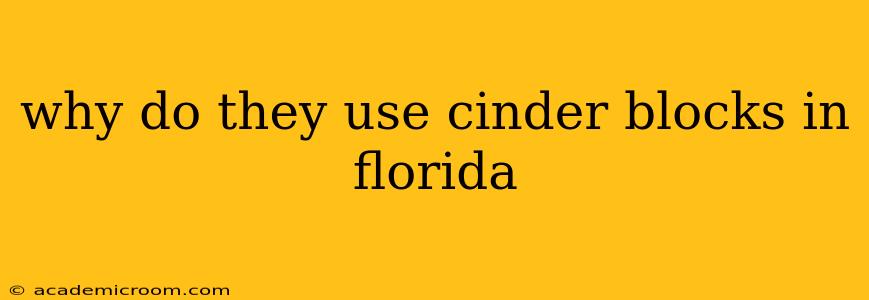Florida's unique climate and building codes heavily influence the choice of construction materials. Cinder blocks, also known as concrete blocks, are a prevalent sight in Florida construction, and their popularity isn't accidental. This article explores the reasons behind their widespread use, addressing common questions and misconceptions.
Why are cinder blocks so common in Florida?
The dominance of cinder blocks in Florida's building landscape stems from a combination of factors:
-
Cost-Effectiveness: Cinder blocks are significantly cheaper than other building materials like brick or poured concrete. This affordability makes them an attractive option for builders and homeowners, especially in a state with a large construction industry. This economic advantage is crucial, particularly for large-scale projects.
-
Durability and Strength: Despite their seemingly lightweight nature, properly constructed cinder block walls offer impressive structural integrity. They are resistant to strong winds, a crucial factor given Florida's hurricane-prone environment. The blocks themselves are robust and can withstand significant impact.
-
Hurricane Resistance: This ties directly into durability. The ability of cinder block structures to resist high winds and flying debris during hurricanes is a major selling point. This resilience translates to lower insurance premiums and increased property safety.
-
Thermal Mass: Cinder blocks possess good thermal mass, meaning they absorb and release heat slowly. This can contribute to a more stable indoor temperature, reducing reliance on air conditioning – a considerable advantage in Florida's hot and humid climate. While not as effective as specialized insulation, it offers a degree of passive temperature regulation.
-
Ease of Construction: Cinder blocks are relatively easy to work with, allowing for faster construction times compared to other methods. This speed translates to lower labor costs and quicker project completion. The standardized size and shape also simplify the building process.
-
Versatility: Cinder blocks aren't limited to load-bearing walls. They can be used in a variety of applications, including retaining walls, fences, and even decorative elements with the right finishing techniques.
Are cinder blocks hurricane-proof?
No building material is truly "hurricane-proof," but cinder blocks offer a significant level of hurricane resistance when properly installed and integrated into a well-designed structure. The blocks themselves are strong, but the overall construction technique, including proper anchoring, reinforcement, and adherence to building codes, is vital for withstanding hurricane-force winds.
What are the disadvantages of using cinder blocks in Florida?
While cinder blocks have many advantages, it's important to acknowledge some drawbacks:
-
Appearance: Some find the aesthetic appeal of cinder block less desirable than other materials like brick or stucco. However, modern finishing techniques can significantly enhance their appearance.
-
Insulation: While offering some thermal mass, cinder blocks require additional insulation to achieve optimal energy efficiency. This adds to the overall construction cost but is necessary for climate control in Florida's extreme temperatures.
-
Moisture Absorption: Cinder blocks can absorb moisture, potentially leading to mold and mildew growth if not properly sealed and protected. Careful planning and the use of appropriate waterproofing techniques are essential.
Are there alternatives to cinder blocks in Florida?
Yes, there are many alternatives, each with its own set of advantages and disadvantages:
-
Concrete: Poured concrete offers exceptional strength and durability but is more expensive and requires specialized expertise.
-
Brick: Brick provides a more aesthetically pleasing appearance but is typically more costly than cinder blocks.
-
Steel framing: Steel framing is gaining popularity for its strength and resistance to high winds, but it's also a more expensive option.
-
Wood framing: While common in other parts of the country, wood framing is less common in Florida due to its susceptibility to insect damage and hurricane vulnerability.
Ultimately, the choice of building material depends on factors like budget, aesthetic preferences, and specific project requirements. While cinder blocks are prevalent in Florida, they are just one option among several viable alternatives. Their cost-effectiveness, durability, and hurricane resistance make them a popular choice, but a well-informed decision requires considering both their advantages and limitations.
